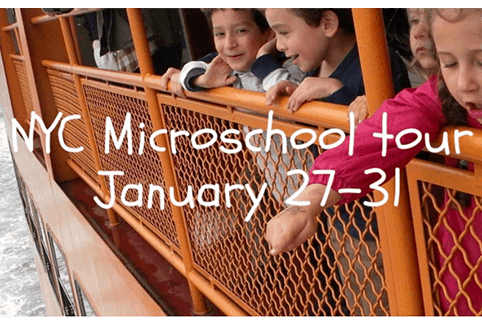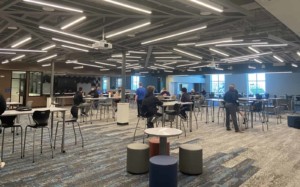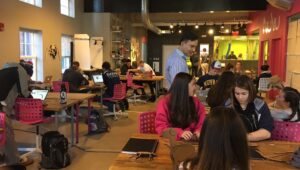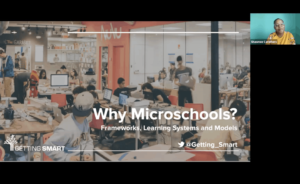Microschools with Macro Impact

Thanks to new learning tools and strategies, the opportunity to open “microschools” as a school-within-a-school or as low-cost private school is getting a lot easier. Models can be as simple as a principal supporting teacher-leaders in trying a new blended, interdisciplinary, and project-based approach. They can be platform-based, produced by an online learning provider that can be adopted by teachers. Even larger districts could use a microschool strategy as part of a collaborative and distributed innovation strategy. Regardless of the size or approach, microschools are fostering cultures of experimentation.
Thinking about starting a microschool but haven’t pulled the trigger yet? Pioneers like Acton Academy, A+UP, and AltSchool are great models, however visiting and engaging can be difficult to organize.
CottageClass is making it possible for you to visit and get an inside look at 12 example microschools this winter. They are hosting the NYC Microschool Tour, on January 27-31. Use “GETTINGSMART” when registering for a 15% discount.
Tour attendees will get to participate in special activities including a tinkering project at Brooklyn Apple Academy, lecture by educational philosopher Peter Gray hosted by Agile Learning Center and classical performances by the kids at Child’s Play NY. The tour includes a reception with wine, cheese and dessert and a private educational consultation with CottageClass founder, Manisha Snoyer. Sign up by January 19 for our early bird special that includes visits to two additional schools in Manhattan and Queens. If you can make it, here are the schools you’ll see:
Agile Learning Center (Upper East Side/East Harlem, Event in Chelsea). Ages 7-16. New York City’s first Agile Learning Center is an independent school for self-directed learners. Students at Agile Learning Centers individualize their learning within the context of a supportive community. They have adapted simple tools for self-organization and intentional culture creation to better support young people in engaging with their passions and curiosities while shaping the environment of the school.
Maple Street School (Lefferts Gardens). Ages 2-4. An NAEYC-accredited parent cooperative preschool that emphasizes nurturing, play, and hands-on learning. They emphasize parent involvement, connection to the community, and a cooperative spirit. At Maple Street School play is central to their progressive philosophy of education and an important part of the curriculum.
Willow Nest (Lefferts Gardens). Ages 2-5. A home-based preschool alternative opened in November 2015. The Willow Nest Studio space is outfitted with a materials lab, an extensive children’s library, and moveable spaces for light and shadow, theatric arts and movement.
Brooklyn Free School (Clinton Hill). Grades Prek-12. Brooklyn Free School’s mission is education for social justice. Always advocating for young people’s voices to be heard, BFS engages students and staff in democratic decision making and problem solving. They honor student choice and facilitate student-centered learning through play and exploration, constructivist teaching, collaborative course work and self-directed student initiatives.
Freebrook Academy (BedStuy). Grades K-12. Freebrook is a democratic community committed to supporting students’ potential to be successful and their ability to define their own futures. Through a progressive approach, and a community, cultural, and social justice foundation, they enable students to explore their world and challenge themselves, while simultaneously encouraging them to challenge injustices, think independently and critically, develop their talents, love learning, and become innovative adults.
Giocare Playspot (Park Slope). Ages 0-5. Giocare offers a number of opportunities for children including full preschool options as well as short drop off and parent attended classes and drop in play. They introduce separation and the preschool routine while encouraging development in all areas. Giocare means “to play” in Italian and as the name suggests, the program has a particular emphasis on play for young children and giving children the space to do this important work.
Brooklyn Apple Academy (Park Slope). Ages 6-13. They provide an experiential education to home school students. Students at B.A.A. are given the time to play outdoors, and the space and resources they need to sustain their curiosity, and become inspired, independent learners.
Parachute Playgroup (Park Slope). Ages 2-5. (Also at Brooklyn Apple Academy). PPL is a small, innovative drop-off playgroup for young children. Class size is limited to no more than six children per session to offer a focused learning environment that benefits the whole group.
South Slope Montessori (Park Slope). Ages 2-5. Imagine South Slope Montessori is a Spanish-English bilingual, privately owned school which offers early childhood education and. child care. Imagine South Slope Montessori features a program that focuses on minimizing stress in a child’s life and maximizes balance, self-respect and inborn aptitudes.
Child’s Play NY (Brooklyn Heights). Ages PreK-12. The Micro-school tour concludes with two exciting performances by Child’s Play NY. Child’s Play NY is a Brooklyn-based company founded in 2009, committed to offering a diverse array of theater arts classes for children. Ranked in Time Out New York Kids as a top theater program, Child’s Play NY is the after-school theater provider at Packer, Berkeley Carroll, Avenues, and many more schools in NYC.
Early registration includes additional visits to:
Queens Paideia (Long Island City, Queens) Grades K-12. Founded in 2009, QPS offers alternative for students who seek academic rigor, emphasis on the “whole student,” and parent involvement in their children’s education. QPS is supported by the Mechner Foundation.
Pono (Upper West Side). Ages 2-9. Pono is an independent, democratic, and outdoor center with the purpose of immersing students in stimulating environments and harmonious learning communities.
For more on Microschools, check out:
- 65 Elementary & Middle Schools Worth Visiting
- Open a Micro-School: Here’s How
- The Micro-School Opportunity
Stay in-the-know with all things EdTech and innovations in learning by signing up to receive the weekly Smart Update.






Manisha Snoyer
Thanks so much for giving a shout-out to our tour, Getting Smart. We're excited to have your readers join our merry band of Micro-school travelers at the end of the month!